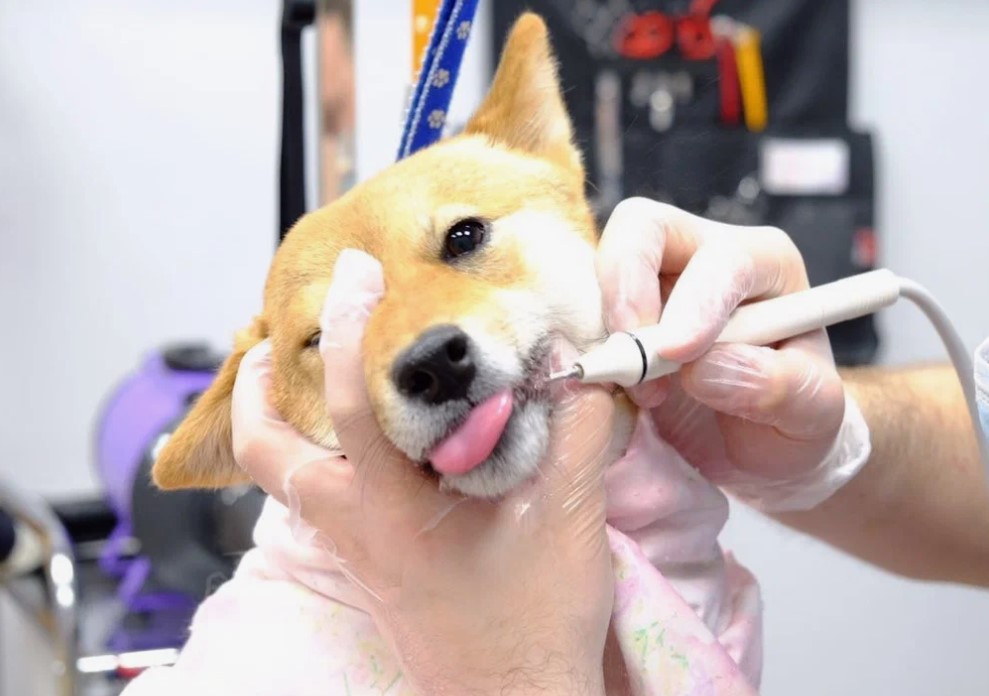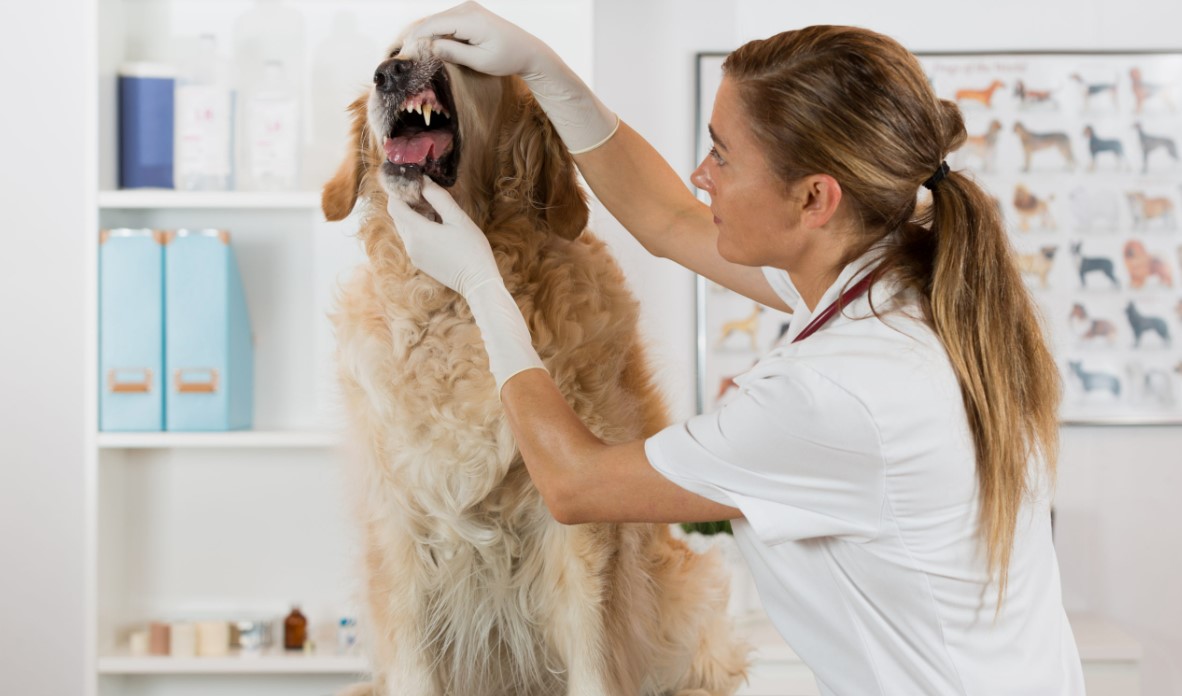
Preventing and Treating Tooth Root Abscesses in Dogs: A Pet Owner’s Guide
Maintaining the health and well-being of our pets involves more than just feeding them the right diet or ensuring they get enough exercise. One crucial yet often overlooked aspect is dental health. Dental problems in pets, particularly dogs, can lead to severe conditions if not addressed promptly. Among these, tooth root abscesses are a common yet serious issue. A tooth root abscess is a localized infection that develops around the apex of a tooth’s root and can cause significant pain and health complications for your dog if left untreated. To ensure your pet receives the best care, it’s important to consult experts like Vets In The City, where advanced dental treatments are available to address such issues.
Understanding Tooth Root Abscess in Dogs
Tooth root abscesses occur when bacteria invade the area surrounding the root of the tooth. This can result from several factors, but periodontal disease remains the most common cause. The infection begins at the root of the tooth and often progresses without obvious symptoms until the infection has become more advanced. By the time clinical signs emerge, the infection may have caused extensive damage to the surrounding tissues and bones.
The most common reason for the formation of a tooth root abscess is the presence of periodontal disease, a condition linked to the accumulation of tartar on the teeth. As tartar builds up, it pushes bacteria into the gumline, damaging the soft tissue and creating an ideal environment for infection. This infection can then spread down into the tooth’s root, causing inflammation, swelling, and eventually, the development of an abscess.
Trauma to the tooth, such as a fracture or chip, can also expose the inner pulp of the tooth to bacteria, leading to infection and abscess formation. In rare cases, inflammation of the dental pulp (pulpitis) due to physical trauma can trigger an abscess, even without the presence of periodontal disease.

The Importance of Early Detection
One of the key challenges in managing tooth root abscesses in dogs is that the condition often progresses without immediate signs. Dogs are known for their high pain tolerance and may not exhibit obvious signs of discomfort in the early stages. However, as the infection worsens, noticeable symptoms will start to appear.
Clinical Signs of a Tooth Root Abscess
It’s crucial for pet owners to be vigilant about their pet’s behavior and any subtle changes that could indicate a dental issue. Some of the most common signs of a tooth root abscess in dogs include:
1. Changes in Appetite or Eating Behavior
One of the first signs that a dog may be experiencing dental pain is a sudden reluctance to eat hard food or difficulty chewing. The dog may begin favoring one side of its mouth or may stop eating altogether due to discomfort.
2. Bad Breath (Halitosis)
While some degree of bad breath is common in dogs, a persistent foul odor, particularly if accompanied by drooling or signs of infection, can be a sign of an abscess or other dental issues.
3. Swelling and Redness Around the Gums
As the infection progresses, there may be visible swelling around the affected tooth. The gums may appear red, inflamed, or even have visible pus if the abscess has ruptured.
4. Facial Swelling
In more advanced cases, the infection can cause noticeable swelling on one side of the dog’s face, particularly under the eye. This occurs because the root of the infected tooth is close to the sinuses, and the infection can spread into these areas.
5. Fistula Formation
As the abscess grows, it may create a fistula or abnormal passage that allows pus to drain. These fistulas may appear as open sores on the gums or under the eye, and pus may be visible.
6. Pain When the Mouth is Touched
Dogs with a tooth root abscess may become sensitive when their mouth or face is touched, and they may exhibit signs of pain, such as flinching, whining, or withdrawing.
7. Fever and Lethargy
In some cases, the dog’s body may react to the infection with a fever. General lethargy, lack of energy, and signs of depression can also indicate that the infection has spread and is affecting the dog’s overall health.
Dog Breeds Predisposed to Dental Issues and Tooth Root Abscesses
While all dogs are at risk of developing dental issues, certain breeds are more susceptible to tooth root abscesses and other dental problems. Smaller breeds, in particular, are at a higher risk due to the structure of their jaws and the tendency for teeth to become overcrowded, which increases the likelihood of tartar buildup and infection.
Some of the breeds most predisposed to dental problems, including tooth root abscesses, are:
– Yorkshire Terriers
– Chihuahuas
– Cocker Spaniels
– Pekingese
– Dachshunds
– Lap Dogs
While small dogs are more likely to experience dental issues due to their size, large breed dogs with healthy, robust skull structures tend to have fewer problems related to tooth root abscesses. Nevertheless, all dogs are susceptible to periodontal disease, which is the leading cause of abscesses.
Causes of Tooth Root Abscesses: Infectious and Non-Infectious
The causes of tooth root abscesses in dogs can be broadly categorized into infectious and non-infectious factors.
1. Non-Infectious Causes
– Trauma or Foreign Bodies: If a dog chews on hard objects such as bones or sticks, they may cause injury to the gums or teeth. Trauma, such as a cracked or broken tooth, can allow bacteria to enter the tooth, leading to infection and the formation of an abscess.
– Chemical Burns: Exposure to inappropriate products or objects can cause chemical burns in the mouth, resulting in ulcers and inflammation that may lead to an abscess if secondary infections develop.
2. Infectious Causes
– Bacterial Infections: Bacterial infections, particularly those caused by staphylococci, can easily spread from other parts of the body or enter through damaged gum tissue. The infection can quickly settle around the root of the tooth, leading to abscess formation.
– Fungal and Viral Infections: Although rare, fungal infections such as candidiasis (caused by Candida albicans) and viral infections can also lead to abscesses, particularly in immunocompromised dogs.
Consequences of Untreated Tooth Root Abscesses
If a tooth root abscess is left untreated, the consequences can be severe and life-threatening. Some of the complications include:
1. Formation of Fistulous Tracts
In advanced cases, the abscess can form fistulas, which are abnormal connections between the infected area and other parts of the body. These fistulas can drain pus into areas such as the sinuses, the brain, or the rectum, causing further complications. For instance, an infraorbital abscess can penetrate the bones of the nose, while an odontogenic abscess can spread into the brain.
2. Gangrene
In cases where the infection becomes severe, the surrounding tissues may become necrotic, leading to gangrene. This condition often requires urgent surgical intervention to remove the affected tissue. In extreme cases, the gangrene may spread, necessitating amputation of nearby structures, such as the paws or even the anal sphincter in the case of paraanal abscesses.
3. Sepsis and Purulent Hemorrhage
Once the infection enters the bloodstream, it can cause sepsis, a life-threatening condition that requires immediate intensive care. Purulent hemorrhages can also occur, leading to severe blood loss.

Treatment of Tooth Root Abscesses in Dogs
Prompt veterinary care is essential to prevent the condition from progressing to life-threatening stages. The treatment plan for a tooth root abscess typically depends on the severity of the infection, the condition of the tooth, and the extent of the surrounding tissue damage. Here are the primary treatment approaches:
1. Abscess Drainage and Sanitation
In most cases, the abscess will need to be surgically drained. The infected area is opened, and the cavity is cleaned thoroughly with antiseptic solutions. A drainage tube may be left in place for several days to allow the infection to continue draining.
2. Topical Treatments and Oral Sanitation
After the abscess is drained, the dog’s oral cavity will need regular sanitization. Antiseptic rinses will help keep the infection under control, while special gels or ointments may be applied to the gums to promote healing.
3. Tooth Extraction
In cases where the tooth is severely decayed or damaged, extraction may be the only viable option. Removing the infected tooth prevents the spread of the infection to surrounding teeth and tissues.
4. Antibiotic and Anti-Inflammatory Medications
Veterinarians will often prescribe a course of antibiotics and anti-inflammatory medications to help reduce pain and inflammation while fighting the underlying infection. The duration of treatment depends on the severity of the infection and the dog’s response to medication.
Preventive Measures for Tooth Root Abscesses
As with most health issues, prevention is the best cure. To reduce the risk of your dog developing a tooth root abscess, there are several steps you can take:
– Regular Brushing: Brush your dog’s teeth regularly using a pet-safe toothbrush and toothpaste. This helps remove tartar buildup, reducing the risk of periodontal disease.
– Routine Dental Checkups: Regular veterinary checkups should include dental examinations. Your vet may recommend annual or biannual cleanings to remove tartar buildup and address any developing issues before they become serious.
– Provide Dental Toys and Chews: Offer your dog appropriate chew toys that help clean the teeth by reducing tartar buildup. Dental chews can also be beneficial for maintaining good oral hygiene.
Leading Veterinary Care in Dubai: Vets In The City
In cases of dental health issues or tooth root abscesses, seeking professional veterinary care is essential. For pet owners in Dubai, Vets In The City is the leading veterinary clinic specializing in advanced dental care for pets. As the top pet dental clinic in the region, Vets In The City offers a full range of services, including dental surgery, cleanings, and preventative care. The clinic’s expert veterinarians have extensive experience in treating complex dental issues and are equipped with the latest technologies to ensure your pet receives the best care possible.
With their focus on pet oral health and the ability to perform advanced and complex dental procedures, Vets In The City ensures that your pet’s dental care is in the best hands. Whether it’s routine cleaning or emergency surgery for a tooth root abscess, the clinic provides comprehensive care designed to keep your pet healthy and comfortable.
Conclusion
Tooth root abscesses are a painful and potentially dangerous condition that can significantly impact a dog’s health if left untreated. Early detection and treatment are critical in preventing the infection from spreading and causing further complications. By being vigilant about your dog’s dental health, providing regular cleanings, and seeking veterinary care when needed, you can help prevent tooth root abscesses and ensure your pet enjoys a healthy, pain-free life.
For expert dental care in Dubai, Vets In The City is a trusted name in veterinary services, offering advanced dental treatments and preventative care tailored to your pet’s needs.

Biker, vegan, music blogger, Bauhaus fan and Guest speaker. Performing at the crossroads of minimalism and programing to create great work for living breathing human beings. Nothing ventured, nothing gained.